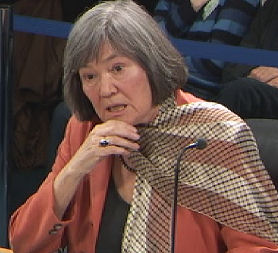Short: Goldsmith 'misled' cabinet over Iraq
Updated on 02 February 2010
Former international development secretary Clare Short accuses Lord Goldsmith, the former attorney general, of misleading the Cabinet over the legality of the Iraq war. Katie Razzall reports.

The attorney general misled the Cabinet about the legality of war in Iraq, Tony Blair lied about a French veto on a UN military action resolution, and Gordon Brown was complicit in a decision to "blame the French" - the incendiary evidence to the Chilcot Inquiry today by Clare Short.
The former international development secretary resigned from the government two months after the invasion of Iraq.
But she said that if she had known then what she knows now, she would have gone sooner.
She told the Chilcot inquiry that the then prime minister, Tony Blair, had deliberately excluded her - and later the Cabinet itself - from information in the build-up to the war.
In the most politically-critical evidence yet given to the inquiry, Ms Short accused Mr Blair of conducting "sofa government", adding: "I don't think there was substantive discussion of anything in the Cabinet... In the case of Iraq, there was secretiveness and deception on top of that."
She said that she had doubts about sanctions, because of the suffering they were causing the Iraqi people, and that she supported the government's stated policy of getting United Nations weapons inspectors back into Iraq, keeping the UN together to back any necessary military action and - if it came to it - getting Saddam Hussein in front of the International War Crimes Court.
When challenged by Sir Roderic Lyne that she, the Cabinet and parliament had ultimately endorsed the invasion, she turned to the role of the attorney general.
"I think he misled the Cabinet. He certainly misled me, but people let it through" she said.
She had not been aware of Lord Goldsmith's "doubts and his changes of opinion" that have since emerged, and - in the light of these, she added: "I think for the attorney general to come and say there's unequivocal legal authority to go war was misleading...But I thought this is the attorney general coming to the Cabinet in the teeth of war and he must be right."
Ms Short denied the claims of both Lord Goldsmith and Mr Blair that Cabinet members had had the opportunity to ask questions about the legal advice. "I said 'That is extraordinary. Why is it so late? Did you change your mind?'...I was jeered at to be quiet and that is what happened."
On the wider issues of justification for the invasion, Ms Short said there had been no evidence of any escalation of the threat from Saddam, so there had been no need to rush to action. "We could have gone more slowly and carefully and not had a more destabilised and angry Iraq, into which comes al-Qaida, which wasn't there before," she told the inquiry.
"Al-Qaida were nowhere near Iraq until after the invasion and the disorder than came from that. By invading and going in in this ill-prepared and rushed way, not only did we cause suffering and loss of life, we made Iraq more unstable and spread al-Qaida influence in the Middle East."
Ms Short revealed that she had at one stage decided to resign from the Cabinet. She had booked a slot with the Commons Speaker to make a statement to parliament announcing her resignation, but had pulled out after being given reassurances by Tony Blair.
She had given a newspaper interview in which she had said she might resign - and then the Commons leader, Robin Cook, had done so.
"He [Tony Blair] rang me up and was very cross and I said "I will go now then". He said "no, no". He didn't want another one, so he asked me to come and see him," she said.
Mr Blair had asked her what was her "bottom line" and she had said she wanted to see progress on the Middle East "road map" towards peace between Israel and the Palestinians and a plan for a United Nations-led reconstruction of Iraq after the war.
Mr Blair had come back to her two days later, after speaking to George Bush, and had said he had commitments from the President on both issues.
"I thought, if we get a Palestinian state and a UN-led reconstruction, that will be better than what would otherwise happen," she said. "I decided to stay and I got a lot of flak, but I still think if we had done those things it would have been so much better." Neither undertaking had been delivered, she added.
Ms Short said she had at the time had "various cups of coffee" with Gordon Brown, who was feeling "very unhappy and marginalised" at the time, but he had believed that the UN will had to prevail.
She had also believed the prime minister when he said that France had vetoed any form of military action against Iraq. "I believed them too often, I think."
Asked about this later, she added: "In my view, that was a lie - a deliberate lie... Someone sent me the whole of Chirac's (French President at the time) statement and it is absolutely clear with everything Chirac said that he wasn't saying 'never'. He was saying 'not now'."
The "tragedy" had been that - because of the special relationship - the government had felt that it had had to go along with the United States.
"Suddenly we are going to war. We can blame the French and concoct the legal authority and off we go," she added.
She had eventually resigned in May that year. "What Blair had promised me wasn't true," she said. "He had just conned me."





